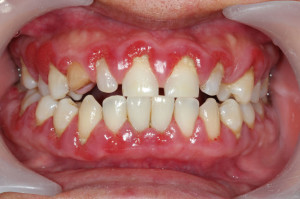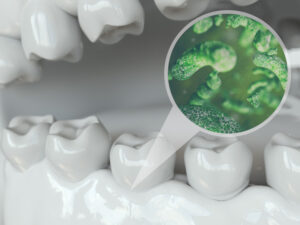The use of essential oils is tried and true. Many cultures have used them for personal care in order to maintain healthy teeth and eve relieve toothache pain.
Swollen gums can be a sign of gum disease or other oral health issues, and it’s important to consult a dentist for a proper diagnosis and treatment. However, some natural essential oils can potentially help reduce gum inflammation and promote oral health. Here are a few essential oils that are commonly used for this purpose:
- Tea Tree Oil: Tea tree oil has natural antibacterial and anti-inflammatory properties that can help reduce gum swelling and fight the bacteria responsible for gum disease. It should be used with caution and diluted in a carrier oil, as it can be quite strong.
- Clove Oil: Clove oil has analgesic and anti-inflammatory properties and can help provide relief from gum pain and inflammation. It also has a numbing effect, which can be useful for temporary pain relief.
- Peppermint Oil: Peppermint oil has antimicrobial and anti-inflammatory properties, which can help reduce gum inflammation and freshen your breath. It can also provide a cooling sensation that soothes discomfort.
- Lavender Oil: Lavender oil has anti-inflammatory and calming properties that can be beneficial for reducing gum inflammation and promoting relaxation.
- Myrrh Oil: Myrrh oil has been traditionally used to promote oral health. It has anti-inflammatory properties and may help reduce gum swelling and support gum healing.
- Eucalyptus Oil: Eucalyptus oil has antimicrobial properties and can help reduce bacteria in the mouth, which can contribute to gum inflammation. It may also provide a refreshing sensation.
- Note: the best essential oils will have antibacterial properties. Oregano oil is one example (thyme oil is another), but is too strong for most people.
When using essential oils for swollen gums, be sure to follow these guidelines:
- Dilution: Essential oils are potent and should be diluted with a carrier oil (such as coconut oil or olive oil) to prevent irritation.
- Application: Apply a diluted solution of the essential oil to the affected area using a clean cotton ball, swab, or a soft toothbrush.
- Rinse: You can create a natural mouthwash by adding a few drops of essential oil to a cup of warm water. Gargle and swish the solution in your mouth, then spit it out.
- Use Caution: Some people may be sensitive or allergic to certain essential oils, so it’s essential to do a patch test before using any new essential oil for oral care.
It’s important to note that while these essential oils may provide temporary relief and potentially support oral health, they are not a substitute for professional dental care. If you have persistent gum swelling or other oral health concerns, consult a dentist for a proper diagnosis and treatment plan.
Swollen gums, also known as gingival swelling or gum inflammation, can have various causes. It’s important to determine the underlying reason for the swelling to receive appropriate treatment. Here are some common causes of swollen gums:
- Gingivitis: This is the most common cause of swollen gums. It is an early stage of gum disease caused by the accumulation of plaque and bacteria on the teeth. Gingivitis can lead to red, swollen, and bleeding gums.
- Poor Oral Hygiene: Inadequate or improper oral hygiene practices, such as infrequent brushing and flossing, can lead to the buildup of plaque and tartar, resulting in gum inflammation.
- Periodontitis: If gingivitis is left untreated, it can progress to periodontitis, a more severe form of gum disease. Periodontitis can cause swollen gums, pockets between the teeth and gums, and even tooth loss. Periodontitis is a more severe progression of periodontal disease, which can lead to tooth decay and tooth pain. Bacterial infections can cause many oral health problems. Natural remedies such as essential oils are included in many natural products for a reason — they really work.
- Pregnancy: Some women may experience swollen gums during pregnancy, a condition often referred to as pregnancy gingivitis. Hormonal changes can make the gums more sensitive to plaque, leading to inflammation.
- Medications: Some medications, such as certain antihypertensive drugs, antiepileptics, and immunosuppressants, may have swollen gums as a side effect.
- Dental Issues: Swollen gums can result from dental problems like abscesses, tooth infections, or improperly fitted dental appliances, such as dentures or braces.
- Nutritional Deficiencies: Inadequate intake of essential nutrients, particularly vitamin C (scurvy) or vitamin K, can lead to gum problems and swelling.
- Allergies: Allergic reactions to certain foods, oral hygiene products, or dental materials can cause gum swelling.
- Tobacco Use: Smoking or using smokeless tobacco products can irritate the gums and lead to inflammation.
- Medical Conditions: Certain medical conditions like diabetes, leukemia, and autoimmune disorders can affect gum health and cause swelling.
- Viral or Fungal Infections: Infections, such as oral herpes or fungal infections like oral thrush, can lead to gum inflammation.
- Injury or Trauma: Physical trauma to the gums, such as accidental biting, injury during dental procedures, or other trauma, can cause swelling.
- Stress: Chronic stress can weaken the immune system and make the gums more susceptible to infection and inflammation.
It’s essential to consult a dentist or healthcare professional if you have swollen gums to determine the cause and receive appropriate treatment. Proper oral hygiene, lifestyle changes, and, in some cases, medication or dental procedures may be necessary to address the issue and prevent further complications.
Swollen gums, also known as gingival swelling, can be caused by various factors, including gum disease, infections, or irritation. The symptoms of swollen gums can vary in severity, but common signs and symptoms may include:
- Redness: Swollen gums often appear red or darker in color than usual healthy gums.
- Puffiness: Gums may become noticeably swollen, causing them to appear larger and more prominent.
- Pain or tenderness: Swollen gums can be sensitive to touch and may cause discomfort or pain, particularly when eating or brushing.
- Bleeding: Swollen gums may bleed when you brush your teeth or floss. This is a common sign of gum inflammation and is often associated with gum disease.
- Bad breath: Gingival swelling can lead to bad breath (halitosis) due to the presence of bacteria and infection in the gum tissue.
- Receding gums: In some cases, swollen gums may pull away from the teeth, causing gum recession. This can expose the tooth roots and lead to increased sensitivity.
- Pus discharge: If an infection is present, you may notice pus coming from the swollen gum area.
- Changes in tooth alignment: Severe gum swelling may affect the alignment of your teeth, making them appear more crowded or crooked.
It’s important to identify the underlying cause of swollen gums and seek appropriate dental care. Common causes of swollen gums include:
- Gum disease (gingivitis or periodontitis)
- Infections, such as abscesses or gum boils
- Poor oral hygiene
- Allergic reactions to certain foods, oral care products, or medications
- Hormonal changes, as in pregnancy or menstruation
- Ill-fitting dental appliances, like braces or dentures
- Nutritional deficiencies, particularly vitamin C deficiency (scurvy)
- Medical conditions, such as leukemia or diabetes
If you’re experiencing swollen gums, it’s a good idea to consult with a dentist or dental professional for a proper diagnosis and treatment. Proper oral hygiene, dental cleanings, and treatment of any underlying conditions are often necessary to alleviate the symptoms and maintain healthy gums.
Oil pulling is an ancient Ayurvedic practice that involves swishing oil in your mouth for a certain period, typically 15-20 minutes, and then spitting it out. The most commonly used oil for this practice is usually coconut oil, but other oils like sesame oil or sunflower oil can also be used. The process is often done in the morning on an empty stomach.
Here’s how oil pulling is typically performed:
- Take a tablespoon of oil and put it in your mouth.
- Swish the oil around your mouth and through your teeth for the specified duration (usually 15-20 minutes).
- Do not swallow the oil, as it is believed to contain toxins and bacteria that you’re trying to remove from your mouth.
- After the recommended time, spit the oil into a trash can or paper towel. It’s important not to spit it into the sink or toilet, as the oil can solidify and potentially clog the plumbing.
Oil pulling is believed to have several potential benefits, one of which is improved oral health, including the alleviation of swollen gums. The idea behind this practice is that swishing oil in the mouth can help remove harmful oral pathogens, oral bacteria, toxins, and plaque, which can contribute to gum inflammation. Here’s how oil pulling is thought to help with swollen gums:
- Reduction of bacteria: Oil pulling is believed to help reduce the number of harmful bacteria in the mouth. Bacteria play a significant role in gum inflammation, so by reducing their presence, oil pulling may help alleviate swollen gums.
- Plaque removal: Swishing the oil can also help remove plaque, which is a soft, sticky film of bacteria that can accumulate on the teeth and gums. The removal of plaque can reduce the risk of gum inflammation and gum disease.
It’s important to note that while oil pulling is a popular practice and has been used for centuries in some traditional systems of medicine, there is limited scientific evidence to support its effectiveness in treating specific dental conditions like swollen gums. Some people may find it beneficial, but it should not be considered a replacement for regular dental hygiene practices such as brushing, flossing, and professional dental care.
If you have swollen gums or other dental issues, it’s essential to consult with a dentist or dental professional for proper diagnosis and treatment. They can provide guidance on the most effective and evidence-based approaches to address your oral health concerns. Essential oils are a gentle natural remedy for the receded gum line.


 Gum disease is almost always caused when
Gum disease is almost always caused when